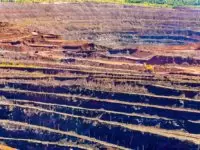
A Metallurgical, Mining and Geological Engineer is in charge of designing, monitoring and administering
What Does a Metallurgical, Mining and Geological Engineer Do?
Engineering is a complex job, requiring a firm understanding of the sciences. Metallurgical, Mining and Geological Engineers are a type of engineering geologist that work with the logistics of mines and mining - existing and new mines. They are involved in the planning of mines, the restructuring as they progress, their safe use and planning. As far as logistics are concerned, they have to efficiently and safely plan the process of moving material out and people in and out every day. They supervise the construction of new shafts inside existing mines and monitor efficiency and production to see if the mine's processes may be improved. These are their hands-on jobs. They are also involved in a number of desk-based roles too.
Typically, they will use primary data and produce it into coherent reports for decision makers. They may or may not be involved in decision making themselves, but they are involved in day to day observations and making recommendations. In the 21st century, they are also responsible for engineering environmental safety and charged with ensuring that a mine runs with sustainability, pollution management and technology associated with the geosciences - GIS and geophysical surveying.
Where Does a Metallurgical, Mining and Geological Engineer Work?
According to 2014 data, there were around 8,300 professional Metallurgical, Mining and Geological Engineers in the USA. Work environment can vary - remote mining facilities away from civilization, gravel pits near to urban centers, and those who work in office based roles in urban areas.
Unsurprisingly, the largest employer of this job type is independent engineering services (24%). Many of these facilities are privately owned and managed and therefore, they require full-time employed engineers to oversee the day-to-day running of it. They can work at the mines, but spend much of their time at desks, mixing their time in a variety of roles, away from the facilities.
15% work in metal ore mining, directly overseeing the mining operations. These individuals tend to spend more time in the actual mine rather than at desks and in offices. Similarly, the 11% that work in oil and gas extraction, and the 10% who work in the coal industry fulfil the same roles. Another 11% work in support activities for the mines (on and off site).
What Is the Average Metallurgical, Mining and Geological Engineer Salary?
The median salary for every individual with this job title is $93,800. Engineering is a highly skilled role, with engineering in resources being amongst the most important and profitable. The lowest 10% earned around $57,040 and the highest earned $156,270 - almost double the industry median. The biggest paying sector for this type of role is the oil and gas industry with a median of $138,380. Support activities also paid way above average with a median salary of $117,880. Metal ore mining paid just beneath the median at $88,950. Salaries in coal mining are $91,320 and Engineering Services pay $88,420.*
Metallurgical Engineering Jobs & Job Description
A Metallurgical Engineer studies various aspects of metals and the identification and unearthing of metals within the ground. The skill set required for this career includes:
- A Bachelor's degree in metallurgy, geological engineering or related field of study
- Perform metallurgical testing and analysis in a laboratory and perform fieldwork outdoors
- Ability to utilize machining and welding equipment if required by the job; exposure to extreme temperatures and heat treatments may be possible
- Dexterity to design mappings and drawings
- Provide support to mining projects, such as hauling and loading coal and the development of mining pits
- Knowledgeable and conform to all environmental and safety laws and regulations
- Ability to use engineering computer software, such as AutoCAD software
- Capability to utilize and maintain field equipment such as GPS (Global Positioning System)
- Produce regular interval reports and data analysis reports
- Collect, analyze and document the data collected
- Identify new products and opportunities through field research
- Study characteristics and behaviors of various metals; identify metal isolation and extraction methods
A Metallurgical Engineering Manager oversees large projects and provides specialized insight into projects and issues. This position incorporates several of the skills required for an entry-level position as well as:
- Possess a Master's degree or PhD in metallurgy, geological engineering or related field of study
- Experience developing mining projects and metallurgical investigations
- Present project designs to management and clients with strong verbal and written communication skills
- Prepare project budgets and work schedules
- Provide training to employees and design training programs
- Identify product need through market analysis and with the intent to support company profitability
- Research new products and methods to decrease costs and increase productivity
- Manage and mentor field and laboratory workers
- Examine and validate engineering drawings
- Identify new alloys available for use and design methods for utilization and processing
- Perform quality assurance tasks and consultation to clients and management
- Ability to think critically and problem solve difficult technical situations
- institutions
What Is the Job Demand for Metallurgical, Mining and Geological Engineers?
Demand for this type of energy is expected to grow in the region of 4% between 2020 and 2030.* Although demand for engineering is always high, and it is a recognized area of skills shortage, much will depend on demand for mining in the core areas of industry. The biggest impact in the next ten years could be the drop in demand for oil and gas. Prices have dropped significantly in the last 5 years globally, meaning there is an oversupply. Global divestment could also have a major impact on demand, and therefore on jobs. However, instability in mining of rare metals could prove a major area of uptake in the USA as the country seeks to explore and exploit pockets of new materials and not rely on imports.
What Are the Education Requirements to Become a Metallurgical, Mining and Geological Engineer?
Students who wish to enter into this career will find that a degree is essential. Furthermore, it must be accredited by the relevant engineering body (ABET). High School students should study math, physics and other hard sciences. College students should select a degree in general engineering. Few educational establishments offer undergraduate or postgraduate degrees in Metallurgical, Mining and Geological Engineering. A typical course will include geology, physics and math, but also practical skills and knowledge such as mining safety. Where not available, students should opt for electives and minors in these science and math related subjects.
It is at post-graduate level that students will be able to hone their studies to become relevant to their intended career area. Master's are preferable and may be essential in areas where there is greater demand. For those who seek greater responsibility, a master's will be essential to their ongoing career development. As this role is practical as well as theoretical, both undergraduate and postgraduate will include fieldwork and project work. A Master's will generally include a thesis in most cases.
If the student wishes to enter into academia as an engineering lecturer, then a Doctorate will be essential. Otherwise, this advanced level of study will not be essential to a practical or advisory role.
Metallurgical Engineering - Related Degrees
What Kind Of Societies and Professional Organizations Do Metallurgical, Mining and Geological Engineers Have?
Engineering of all kinds have a number of representative bodies. Here are those most relevant to Metallurgical, Mining and Geological Engineers.
- Society for Mining, Metallurgy, and Exploration: With 15,000 members in over 100 countries, this international body support and advise engineers working in mineralogy and mining
- International Mining and Minerals Association: The only body supporting all strands of IOM3, they act as a bridge between industry and academia in supporting their multipronged mission statement
*2020 US Bureau of Labor Statistics salary figures and job growth projections for mining and geological engineers reflect national data not school-specific information. Conditions in your area may vary. Data accessed September 2021.





